#Claudine Gay is corrupt
Text
By: Aaron Sibarium
Published: Dec 11, 2023
Harvard University president Claudine Gay plagiarized numerous academics over the course of her academic career, at times airlifting entire paragraphs and claiming them as her own work, according to reviews by several scholars.
In four papers published between 1993 and 2017, including her doctoral dissertation, Gay, a political scientist, paraphrased or quoted nearly 20 authors—including two of her colleagues in Harvard University’s department of government—without proper attribution, according to a Washington Free Beacon analysis. Other examples of possible plagiarism, all from Gay’s dissertation, were publicized Sunday by the Manhattan Institute’s Christopher Rufo and Karlstack’s Chris Brunet.
The Free Beacon worked with nearly a dozen scholars to analyze 29 potential cases of plagiarism. Most of them said that Gay had violated a core principle of academic integrity as well as Harvard’s own anti-plagiarism policies, which state that "it's not enough to change a few words here and there."
Rather, scholars are expected to cite the sources of their work, including when paraphrasing, and to use quotation marks when quoting directly from others. But in at least 10 instances, Gay lifted full sentences—even entire paragraphs—with just a word or two tweaked.
In her 1997 thesis, for example, she borrowed a full paragraph from a paper by the scholars Bradley Palmquist, then a political science professor at Harvard, and Stephen Voss, one of Gay’s classmates in her Ph.D. program at Harvard, while making only a couple alterations, including changing their "decrease" to "increase" because she was studying a different set of data.
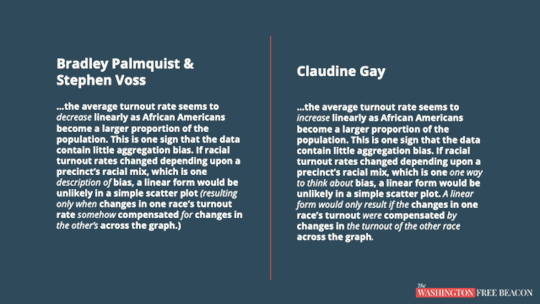
The four papers that include plagiarized material comprise a sizable portion of Gay’s academic work. Gay, who is Harvard's 30th president, has authored just 11 peer-reviewed articles.
"If this were a stand-alone instance, it would be reprehensible but perhaps excused as the blunder of someone working hastily," said Peter Wood, a former associate provost of Boston University, where he helped investigate several cases of suspected plagiarism. "But that excuse vanishes as the examples multiply," said Wood, who now serves as the director of the National Association of Scholars.
Some of the most clear-cut cases come in Gay’s 1997 dissertation, "Taking Charge: Black Electoral Success and the Redefinition of American Politics," which copied two paragraphs almost verbatim from Palmquist and Voss.
The paragraphs—from a paper Palmquist and Voss had presented a year earlier, in 1996—do not appear in quotation marks. One is unmodified but for a handful of words, and Gay does not cite Palmquist or Voss anywhere in her dissertation.

"This is definitely plagiarism," said Lee Jussim, a social psychologist at Rutgers University, who reviewed 10 side-by-side comparisons provided by the Free Beacon, including the paragraphs from Gay’s dissertation, which received a prize from Harvard for "exceptional merit."
"The longer passages are the most egregious," he added.
Academics say the pattern raises serious questions about Gay’s scholarly integrity and her fitness to lead the nation’s oldest university, which has been at the center of a political firestorm under her watch, particularly since Oct. 7. Student activists have blamed Israel for the Hamas terrorist attack and Gay herself offered equivocal testimony before Congress about whether calls for the genocide of Jews violate Harvard’s code of conduct.
Donors, alumni, and over 70 congressmen have called on Gay to resign. University of Pennsylvania president Liz Magill, who testified alongside Gay, tendered her resignation on Saturday.
"The question here is whether the president of an elite institution such as Harvard can feasibly have an academic record this marred by obvious plagiarism," said Alexander Riley, a sociologist at Bucknell University. "I do not see how Harvard could possibly justify keeping her in that position in light of this evidence."
Neither Gay nor Harvard responded to a request for comment.
Other cases of near-verbatim quotation occur in two peer-reviewed journal articles from 2017 and 2012, when Gay was a tenured professor at Harvard, as well as in an essay she published one year out of college, in 1993. Along with her dissertation, the decades-long pattern paints a picture of sloppiness, at best, and willful dishonesty at worst.
"It seems clear that Gay had a habit of using others' words in ways that violated Harvard's policies," a professor at a top research university, who received his Ph.D. from Harvard’s government department, told the Free Beacon. "And several examples would land any student in serious trouble."
Gay’s 1993 essay, "Between Black and White: The Complexity of Brazilian Race Relations," lifts sentences and historical details from two scholars, David Covin and George Reid Andrews, with just a few words dropped or modified. Covin is not cited anywhere in the essay.
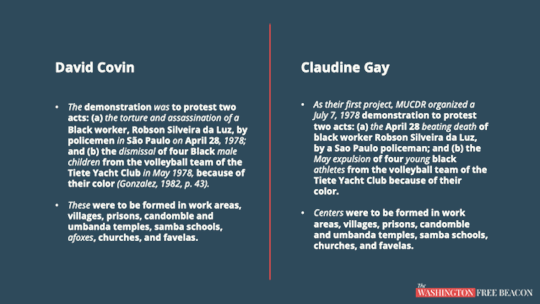
In a section called "Suggestions for Further Reading," Gay does include Andrews’s 1991 book, Blacks & Whites in São Paulo, Brazil, 1888-1988, but not his 1992 paper, "Black Political Protest in São Paulo, 1888-1988," from which the offending text was drawn.
The 1993 essay "concerns me less," Riley said, given how early it was in Gay’s career. "However, it shows a quantity of plagiarism so egregious that minimally Dr. Gay should stop putting it on her CV."
The two peer-reviewed papers, by contrast, are "much more serious," Riley said.
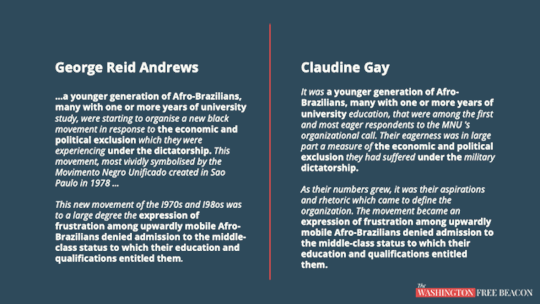
In "Moving To Opportunity: the Political Effects of a Housing Mobility Experiment," Gay borrowed language from a 2003 report by eight researchers—three of them Harvard economists—prepared for the Department of Housing and Urban Development.

And in "A Room for One’s Own? The Partisan Allocation of Affordable Housing," Gay borrowed language from a 2010 book by Alex Schwartz, Housing Policy in the United States, and from a 2011 paper by Matthew Freedman and Emily Owens, "Low-Income Housing Development and Urban Crime."
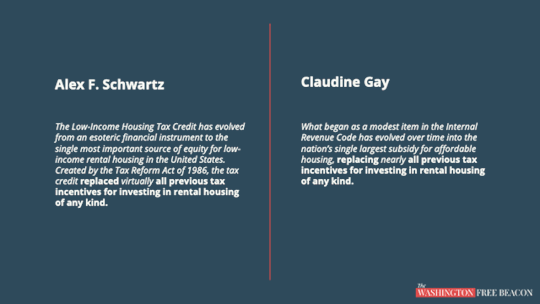
Freedman and Owens are never cited, though Gay thanks them for letting her use their data. Gay does cite Schwartz and the eight researchers elsewhere in "Moving to Opportunity" but not in the sentences where their quotes appear. None of the passages have quotation marks, creating the impression that they are Gay’s own language and ideas.
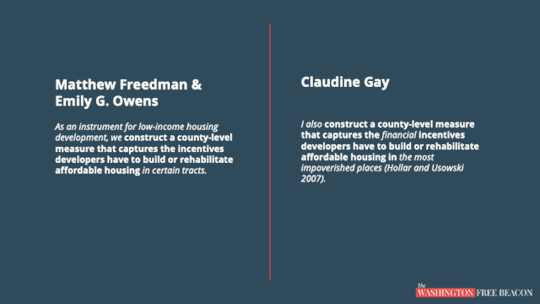
Some examples are more borderline than others, scholars who reviewed them said, but clearly violate Harvard’s guide on sourcing, which requires citations even when using "ideas that you did not think up yourself," regardless of how much the language has changed. Plagiarism, the guide adds, is "unacceptable in all academic situations, whether you do it intentionally or by accident."
Even crediting a source in the wrong sentence, as Gay did repeatedly, is a serious offense under Harvard’s policies. The school’s sourcing guide includes multiple examples of "mosaic plagiarism," in which placing a citation too late or too early in a passage causes "confusion over where your source's ideas end and your own ideas begin."
Gabriel Rossman, a sociologist at the University of California, Los Angeles, said that several portions of Gay’s work met the definition of "mosaic plagiarism" outlined in Harvard’s guide. So did Steve McGuire, a member of the American Council of Trustees and Alumni and a former professor of political theory at Villanova University, who said the examples "violate the expectations Harvard has for its own students."
"As a professor, I would not have accepted this kind of work from a first semester freshman," McGuire told the Free Beacon. "It’s appalling to see it in the work of Harvard’s president."
Rossman, who specializes in quantitative research, noted that some of the examples involve technical descriptions of statistical methods, which "can require very precise wording" and are often repeated between authors, a potentially mitigating factor. But an editor at one of the five most-cited academic journals in the world pushed back on that notion, arguing that even that sort of duplication in academic prose is difficult to defend.
"The text duplication points to carelessness, sloppiness, and short-cut taking," said the editor, who has edited journals in both the natural and social sciences.
Some of the victims of Gay’s plagiarism were more sanguine. Jeffrey Liebman, one of the Harvard economists who prepared the Department of Housing report, said he and four of his coauthors did "not see any signs of plagiarism." Like Rossman, he argued that it was defensible for scholars to crib technical descriptions from each other.
Gay "had the right to use and adapt this common language," he said.
Voss, who coauthored the 1996 paper with Palmquist, said that although the paragraphs Gay quoted were "technically plagiarism," they were "not terribly important" to her argument.
"If I caught a student doing that, I would tell them it was inappropriate," Voss said. "But I would never consider taking action against the student."
But Wood, the former Boston University associate provost, said the feelings of the plagiarized are irrelevant.
The "willingness of the actual author to go along with the copying (whether before the fact or afterwards) doesn't change the deceptive nature of the act of plagiarism," he said. "The plagiarist is breaking the trust of the community of readers. In the case of scholarship, the whole university community is the victim."
It is common for plagiarized authors to come to the defense of their plagiarizer, Wood said. When Princeton historian Kevin Kruse was accused of plagiarizing Ronald Bayor, a historian at Georgia Tech, for example, Bayor dismissed the accusations as "politically motivated."
Other cases of possible plagiarism—all from Gay’s dissertation—were uncovered Sunday by the Manhattan Institute’s Rufo and Karlstack’s Brunet. Though the revelations are new, rumors of Gay’s plagiarism have been circulating on econjobrumors.com, a popular message board for social scientists, since at least January 2023.
"Most plagiarists turn out to be serial thieves," Wood said. "If the offense is discovered in one publication, typically it will be found in others."
In a statement to the Boston Globe, Gay said she stood by the integrity of her scholarship.
The Harvard Corporation, which held an emergency meeting over the weekend after Gay’s disastrous testimony on Capitol Hill last week, did not respond to a request for comment.
Update 10:10 p.m.: An earlier version of this story incorrectly stated that Gay had not cited Alex Schwartz in the paragraph where his quote appears. She did cite him in that paragraph, but not in the sentence where she quoted him.
==
This is what happens when you hire for DEI, not merit.
In spite of all of this, Claudine Gay should not be fired for plagiarism, any more than Kendi should be rejected for his financial mismanagement. Because this misses the point.
Harvard's own paper, The Harvard Crimson, reports that over 700 staff and faculty are in support of her remaining on. They cite "university independence." Which should reasonably be taken as an agreement to no longer accept public funding, even though that level of integrity is not what they meant.
What the 700 supporters does indicate is how far and how extensively the ideological corruption has set in. That's the reason she should be dismissed. She should be let go because Harvard has decided to abandon intersectional DEI garbage as its primary telos, and to reclaim its academic integrity and rebuild its - perhaps irreparably - damaged reputation.
The problem is that, unsurprisingly, its council have officially chosen the intersectional DEI garbage over any pretence to integrity.

#Claudine Gay#Harvard University#Claudine Gay is corrupt#academic corruption#plagiarism#eradicate DEI#diversity equity and inclusion#diversity hire#diversity#equity#inclusion#DEI bureaucracy#unethical#ethics violations
14 notes
·
View notes
Text
“A lack of trust in our leadership and our major institutions might turn out to be the fulcrum upon which the 2024 elections will turn . . .”
#leadership#extremism#democracy#education#save america#government#joe biden#accountability#claudine gay#corruption#election 2024#fear#higher education#personal responsibility#politics#protest#voter anger#voting
13 notes
·
View notes
Text
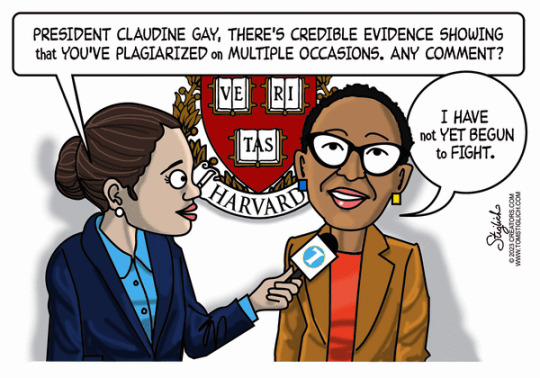
12 notes
·
View notes
Link
Fake it till you make it
1 note
·
View note
Text
0 notes
Text
Another Bozo Billionaire
Idan Ofer, billionaire bozo, who sits on one of Harvard’s two corrupt and morally blind guiding boards, has resigned because he feels that President Claudine Gay’s response to the Harvard students who defended Hamas was lukewarm.
I imagine Mr. Ofer is in favor of the genocide that Israel is now committing against the people of Gaza – justified of course.
Forget about Jewish persecution of…
View On WordPress
0 notes
Text

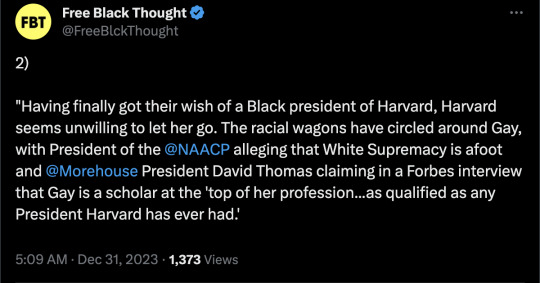



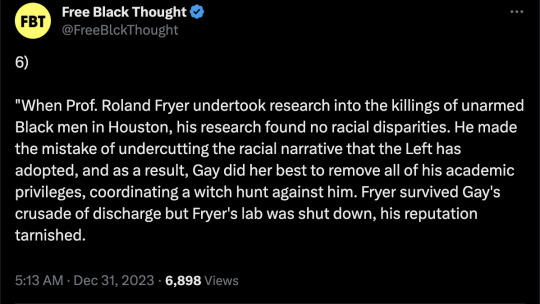

By: Winkfield Twyman Jr.
Published: Dec 27, 2023
I have a tender spot in my heart for race pioneers. My spirits were lifted when L. Douglas Wilder was sworn in as the first Black American governor of a U.S. state—the state of Virginia, of which I am a native son. My mom was dying of cancer at the time, but she wanted me to witness Black History in the making. So on that cold January day in 1990, I left her bedside and bore witness to the coming of a better time in Virginia.
Similarly, on the night of November 4, 2008, when Barack Obama was elected the first Black President of the United States of America, I joined family and friends to run into the darkness of the San Diego night, yelling and screaming, whooping and hollering. It was a sacred moment in our American history to be always cherished and never forgotten. That the American electorate would elect a Black person to the highest office in the land was something our grandparents and our grandparents' grandparents could only dream of.
I considered the project of race in America to be finished that November night in San Diego. The election of a Black U.S. president broke the psychological barrier in our minds. There is no higher office than President of the United States of America—in the entire world. For me, the questions of race were all answered. I was done with race.
But too many Americans can't seem to quit race. Fifteen years after President Barack Obama's triumph, some feel it noteworthy to remark that Claudine Gay is the first Black President of Harvard University. Worse, in the face of numerous mounting scandals, many are defending Gay by claiming that the attacks against her are racial in nature.
They are not. They are all well deserved.
The demand that Gay resign stems from the utter lack of moral competency she displayed in her testimony before Congress, in which she said that calling for the genocide of Jews is only against Harvard rules in certain contexts. She also failed to condemn the Hamas atrocities against Israel in real time on October 7, another reason she should resign. There is also now evidence of serial plagiarism. And did I mention Gay has published no books—an unprecedented feat for a Harvard President, unless one travels back in time to the year 1773?
And yet, many are coming to her defense. Having finally got their wish of a Black president of Harvard, Harvard seems unwilling to let her go. The racial wagons have circled around Gay, with President of the NAACP alleging that White Supremacy is afoot and Morehouse President David Thomas claiming in a Forbes interview that Gay is a scholar at the "top of her profession... as qualified as any President Harvard has ever had."
This is not only misguided, but deeply ironic. Did you know that Claudine Gay during her Harvard career has repeatedly targeted and disrupted the careers of prominent Black male professors?
As Dean of the College, Gay terminated Ronald S. Sullivan, Jr. as Faculty Dean of the Winthrop House. Professor Sullivan, Jr., a graduate of Morehouse College and Harvard Law School, was the first Black faculty dean of a house in the history of Harvard College.
What was Professor Sullivan's offense? Sullivan deigned to represent the disgraced movie producer Harvey Weinstein—an act of moral conscience, since all are entitled to legal representation in our legal system. Yet legal conscience mattered not to Claudine Gay, who terminated a race pioneer for doing his civic duty.
You may excuse this heartless termination as a one-off. You would be wrong. Economics Professor Roland G. Fryer, Jr. was next in the sights of Dean Gay. Fryer was a top Black professor at Harvard. After having overcome all sorts of hardship and childhood deprivation, Professor Fryer joined the faculty at Harvard to become the second-youngest professor ever to be awarded tenure at Harvard, and went on to blaze a trail of distinction, including winning the MacArthur Fellowship and the John Bates Clark Medal.
Yet when Fryer undertook research into the killings of unarmed Black men in Houston, Fryer's research found no racial disparities. He made the mistake of undercutting the racial narrative that the Left has adopted, and as a result, Gay did her best to remove all of his academic privileges, coordinating a witch hunt against him. Fryer survived Gay's crusade of discharge but Fryer's lab was shut down, his reputation tarnished.
No one in good faith should defend President Gay because she is the first Black president of Harvard. Even if you don't agree with me that our racial struggle is in our past, someone who has targeted Black male professors has waived any benefit of the "first Black" defense.
W. F. Twyman, Jr., Class of 1986 Harvard Law School, is a former law professor. He is also co-author of Letters in Black and White: A New Correspondence on Race in America published by Pitchstone Publishing.
==
I've said it before and I'll say it again: Claudine Gay is as corrupt as they come.
#Winkfield Twyman Jr.#Claudine Gay#Harvard University#Harvard#Claudine Gay is corrupt#Roland Fryer#academic corruption#diversity hire#diversity equity and inclusion#diversity#equity#inclusion#plagiarism#corruption#religion is a mental illness
9 notes
·
View notes
Text
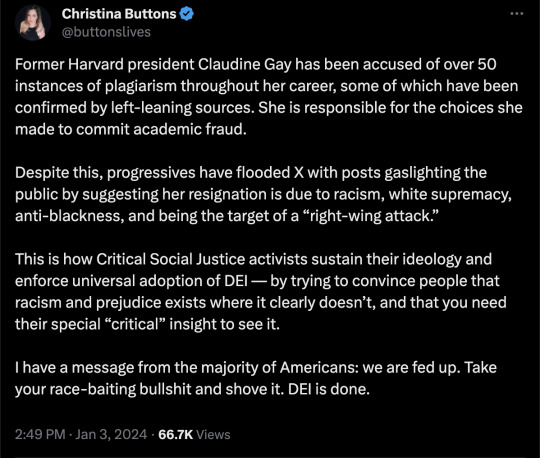
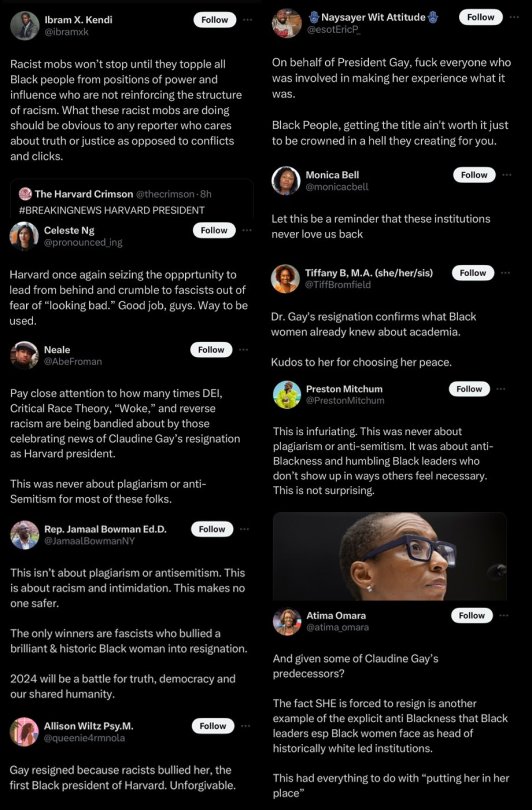
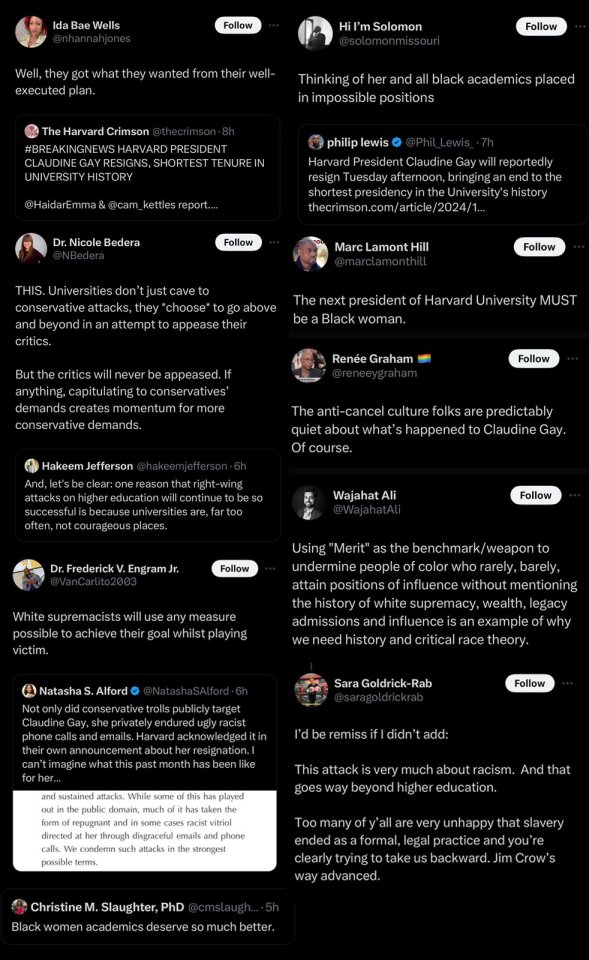
Notice how they will not hold her accountable for her own actions. That's the actual racism.

The scam is over. DEI is dead.
#Christina Buttons#Claudine Gay#Claudine Gay is corrupt#Harvard University#Harvard#academic fraud#academic corruption#gaslighting#diversity equity and inclusion#DEI must die#DEI bureaucracy#diversity#equity#inclusion#plagiarism#religion is a mental illness
15 notes
·
View notes
Text

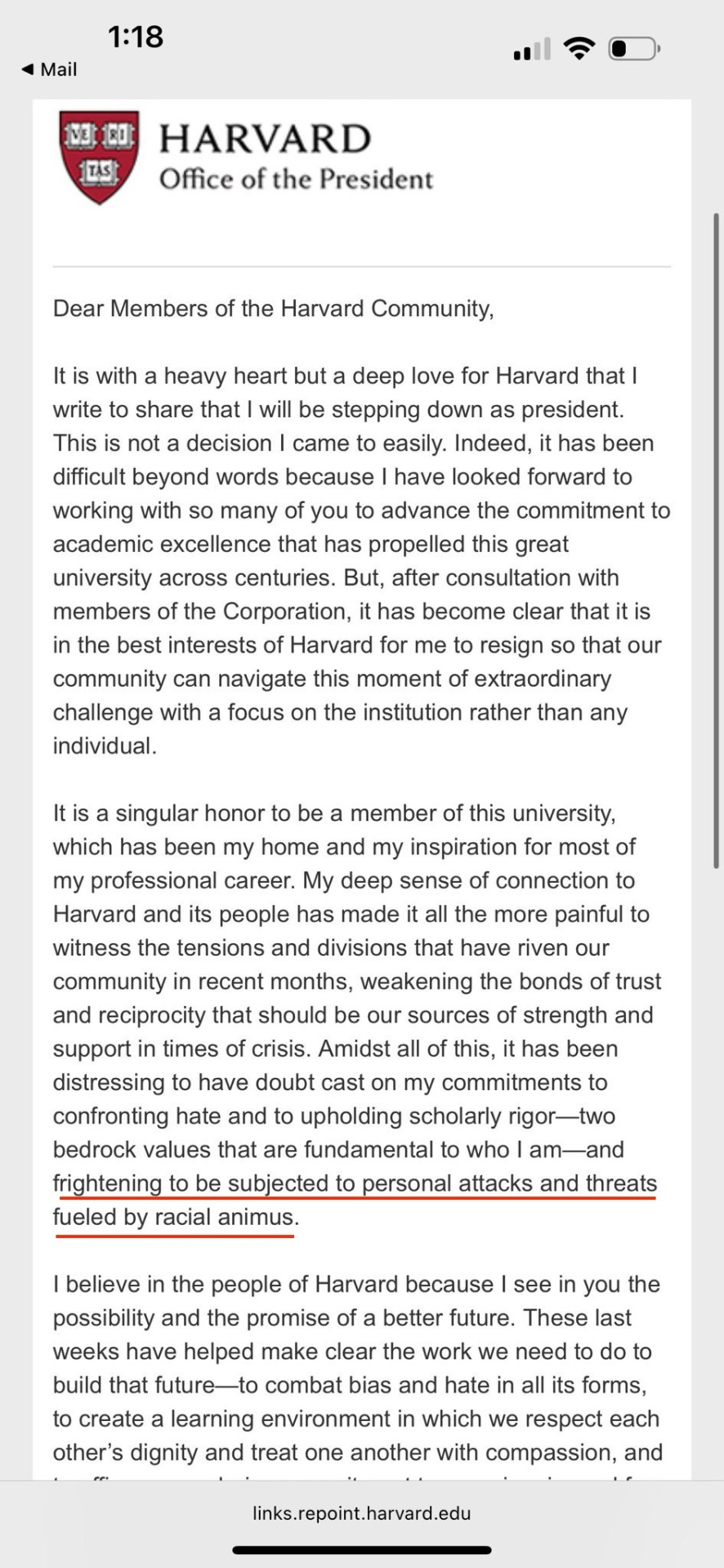
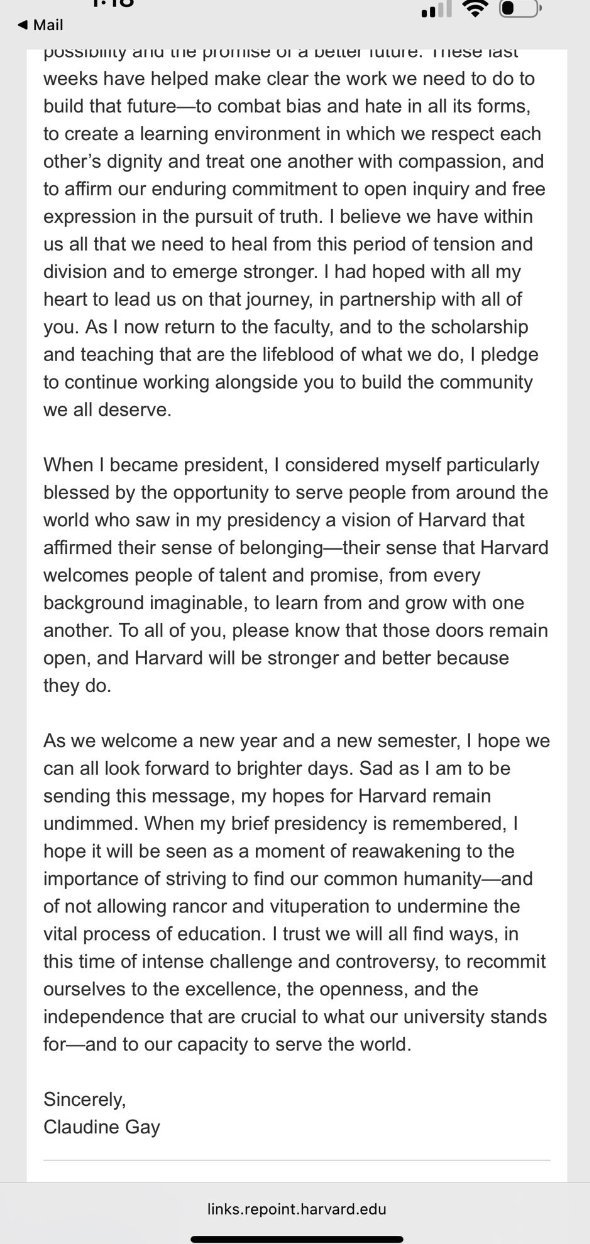

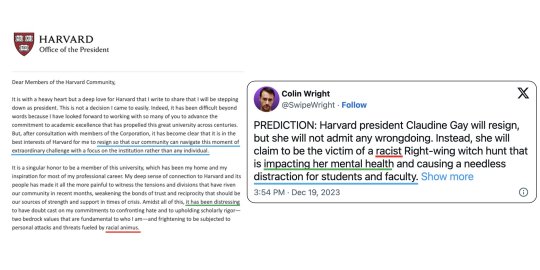
Of course, the usual suspects are out in full force.
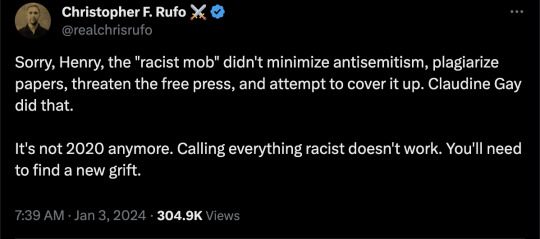
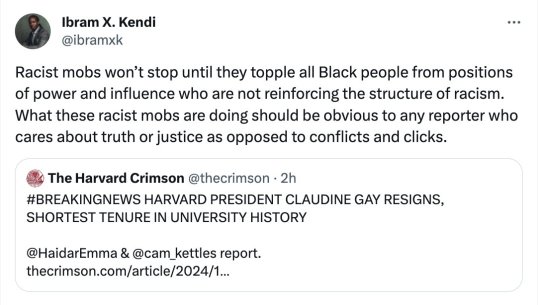
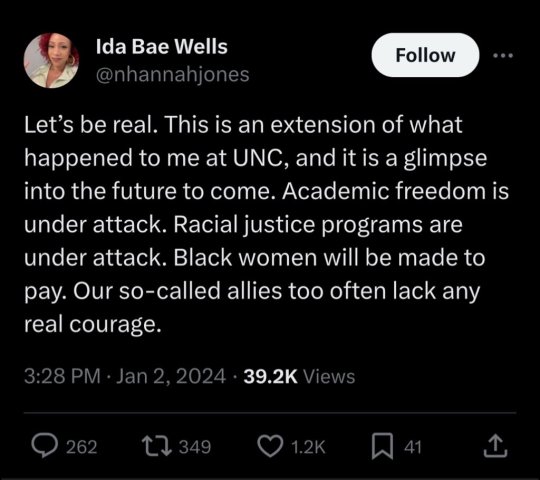

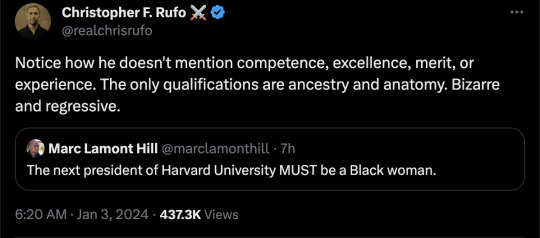
Apparently, being held to the same standards as every student in the university is "racism." This is how pathetic and fake accusations of "racism" have degenerated into.
They've been pulling this bullshit for the last few years, only now it's not working any more. This could be the tipping point where the crazy little girls who were accusing everybody of being witches lose their power and the witch-hunt hysteria comes to a very quick end.
What's really notable is that they're not upset that a prominent black, female "scholar" is a fraud, it's that a prominent black, female "scholar" has been shown to be a fraud. They're literally angry at the messenger.
Never forget that Claudine Gay stole from black scholars, such as Carol M. Swain, orchestrated the dismissal of Ronald S. Sullivan Jr., a black professor, because she disagrees with due process and the principle of "guilty until innocent," and conspired to have black professor Roland Fryer's work shut down because it completely blew up her whole rac-grifting career. Claudine Gay is no victim. She's manipulative, deceitful and unscrupulous.
youtube
There's no better proof that these lunatics are anti-merit, anti-responsibility and anti-intellectual than their defence of someone with a career-long history of theft and fraud. Claudine Gay was a nothing but a corrupt and dangerously unqualified diversity hire in the first place and never should have been president at all, much less retain her ill-gotten position once her fraud was uncovered.
#Claudine Gay#Claudine Gay is corrupt#Claudine Gay scandal#Harvard University#Harvard#plagiarism#academic fraud#academic corruption#diversity hire#DEI hire#DIE must die#diversity equity and inclusion#diversity#equity#inclusion#bigotry of low expectations#religion is a mental illness
8 notes
·
View notes
Text
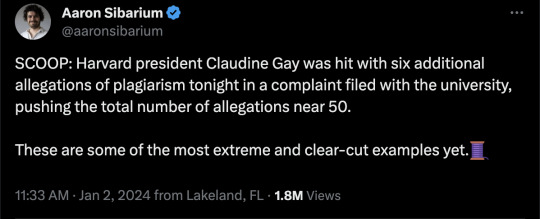
By: Aaron Sibarium
Published: Jan 1, 2024
Harvard University president Claudine Gay was hit with six additional allegations of plagiarism on Monday in a complaint filed with the university, breathing fresh life into a scandal that has embroiled her nascent presidency and pushing the total number of allegations near 50.
Seven of Gay’s 17 published works have already been impacted by the scandal, but the new charges, which have not been previously reported, extend into an eighth: In a 2001 article, Gay lifts nearly half a page of material verbatim from another scholar, David Canon, a political science professor at the University of Wisconsin.
That article, "The Effect of Minority Districts and Minority Representation on Political Participation in California," includes some of the most extreme and clear-cut cases of plagiarism yet. At one point, Gay borrows four sentences from Canon’s 1999 book, Race, Redistricting, and Representation: The Unintended Consequences of Black Majority Districts, without quotation marks and with only minor semantic tweaks. She does not cite Canon anywhere in or near the passage, though he does appear in the bibliography.
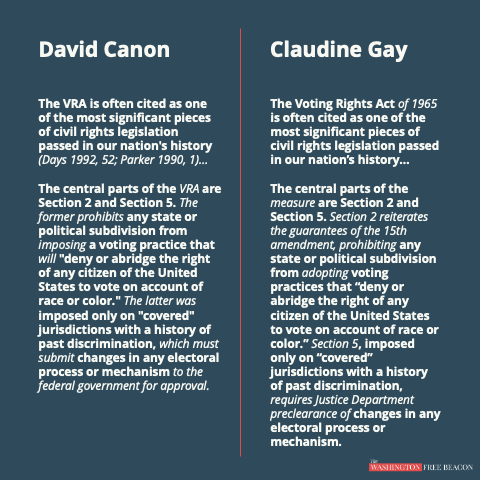
Beyond that, Gay’s first two footnotes are copied verbatim from Canon’s endnotes.
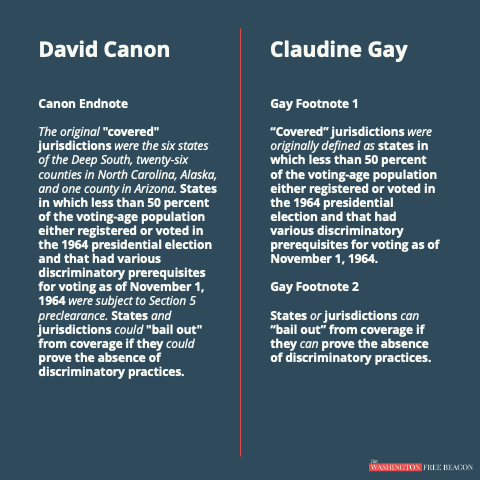
Canon, like several of the scholars Gay has quoted without attribution, insisted that she had done nothing wrong.
"I am not at all concerned about the passages," Canon told the Washington Free Beacon. "This isn't even close to an example of academic plagiarism."
Though Harvard's governing board, the Harvard Corporation, said in mid-December that it had reviewed Gay’s published oeuvre and found several cases of "inadequate citation," it did not identify any of the examples described in the new complaint, which was submitted to the school’s research integrity officer, Stacey Springs, and obtained by the Free Beacon.
The discrepancy raises troubling questions not just about the scope of Gay’s plagiarism, which appears to afflict half of her published works, but also the thoroughness and seriousness of the Corporation’s probe, which the board described as "an independent review by distinguished political scientists."
The review was completed in just a few weeks—far less time than the 6 to 12 months typical of other plagiarism investigations—and the Corporation has refused to disclose the names of the academics who conducted it. A Harvard spokesman, Jonathan Swain, did not respond to a request for comment about whether the school has reviewed all of Gay’s work, and, if so, how it missed the examples unearthed on Monday.
"The board’s review of Gay’s work was too brief to inspire confidence," the complaint reads. "So we now know for certain that the board’s investigation was a sham."
The allegations filed Monday also include more material from Gay’s dissertation, which has already received three corrections. In one of the new examples, Gay, who works in quantitative political science, lifts a full sentence from her thesis adviser, Gary King, to describe a mathematical model. She does not cite King in parentheses or put his words in quotation marks.
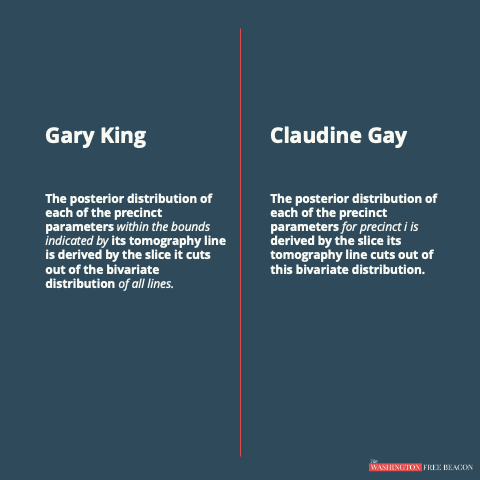
While some of Gay’s defenders have claimed that technical descriptions do not require attribution in the social sciences, since there are only so many ways to explain a method or a formula, a Harvard handbook from 1998—the year Gay completed her dissertation—says otherwise.
"Citing tells your readers that the strategy or method isn’t original with you and allows them to consult its original context," the handbook states. King, who has downplayed previous charges against Gay, did not respond to a request for comment.
The rest of the new examples center on a 1996 paper by Frank Gilliam, "Exploring Minority Empowerment: Symbolic Politics, Governing Coalitions and Traces of Political Style in Los Angeles," that Gay repeatedly quotes without attribution, changing just a few words here or there. Those passages describe big-picture findings and do not include technical verbiage. Gilliam, now the chancellor of the University of North Carolina-Greensboro, did notrespond to a request for comment.
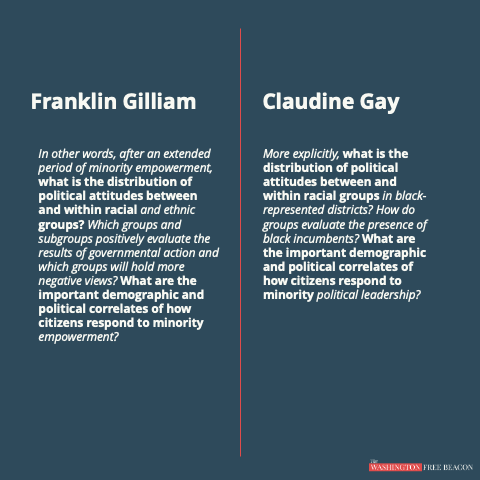
The new complaint comes as an increasing number of Harvard students are speaking out against Gay, arguing that she has been held to a lower standard than the average undergraduate. One student on Harvard’s honor council, a jury-like body that adjudicates allegations of plagiarism and cheating, wrote in an anonymous op-ed that students are routinely suspended for doing what Gay did. Some students have called on Gay to resign, and others seem reluctant to defend their embattled president.
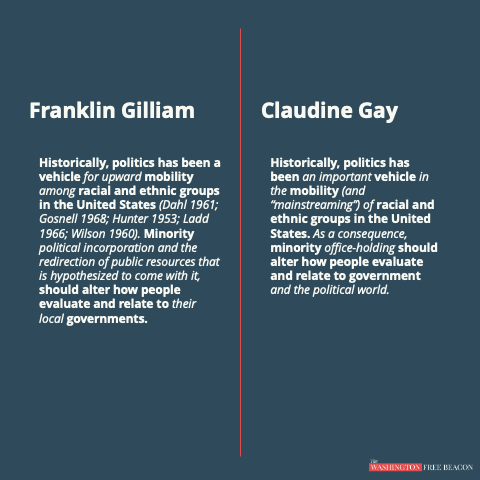
"President Gay Plagiarized, but She Should Stay," read the headline of a Harvard Crimson editorial. "For Now." The paper says the allegations of plagiarism are focused on "her PhD dissertation and two of her 11 published journal articles," leaving out the many allegations relating to articles that were not peer-reviewed.
The paper's qualified editorial position -- "for now" -- represents a shift in tone from the paper’s editorial board, which previously opined that—for the sake of a "free democracy"—Gay "must not yield" to "partisan attacks" in the wake of her disastrous testimony on anti-Semitism.
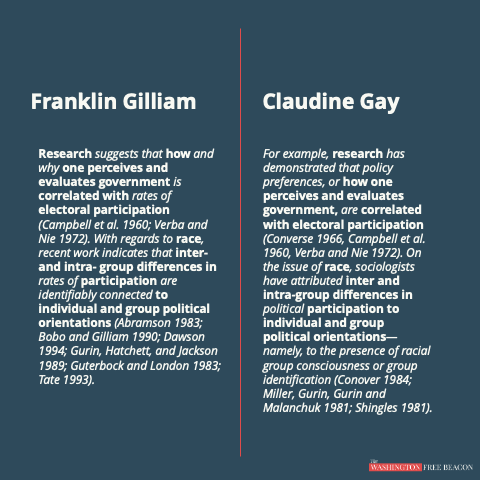
Gay’s most outspoken defenders have been her faculty colleagues. Randall Kennedy, a Harvard Law School professor, told the New York Times that the plagiarism charges were ginned up by "professional vilifiers" and "bad faith" actors—and went on to suggest the university may not cooperate with the congressional investigation underway into its adjudication of Gay’s work.
Another Harvard lawyer, Charles Fried, was more explicit, describing the allegations as an "extreme right-wing attack on elite institutions."
"If it came from some other quarter, I might be granting it some credence," he told the Times. "But not from these people."
Harvard said in December that Gay’s "duplicative language," while "regrettable," did not constitute research misconduct because it was not "intentional or reckless," citing a policy that only governs faculty and is less stringent than the rules for students.
But as more allegations have surfaced, some professors have begun to break ranks. A few told the Boston Globe in December that Gay’s treatment reeked of hypocrisy and double standards. And Omar Haque, a psychiatrist at Harvard Medical School and a member of the university’s Council on Academic Freedom, said that the sheer breadth of the examples—especially those from the pre-word processor days—made it hard to fathom that everything was unintentional.
"Gay's alleged plagiarism in the 1990s may be more serious than in in recent years," he told the Free Beacon, "because prior to the use of computers to highlight and copy/paste text in seconds, plagiarism was more likely to be non-accidental and intentional and reckless."
Haque, who said he was speaking only in a personal capacity, added that it took "greater effort" to plagiarize with a typewriter.
The blowback has been exacerbated by the Harvard Corporation’s feckless response to the allegations, which it initially tried to squash with a legal threat to the New York Post—and to the unnamed whistleblower who brought those allegations to the Post’s attention.
Through the bellicose litigation boutique Clare Locke, Harvard said in October that it would sue for "immense damages" if the Post published a story on the charges. It also "threatened to use legal means to out who had supplied the comparisons," according to the paper’s reporting.
That person, a professor at another university, whom the Free Beacon has identified and granted anonymity, is behind the Monday complaint to Harvard, as well as a separate complaint last month alleging around 40 cases of plagiarism. While several Harvard scholars have faced plagiarism allegations since the early 2000s, none have seen such a large percentage of their work implicated.
Beyond outlining the new charges against Gay, the latest complaint -- 25 pages of which are devoted to outlining the various examples of Gay's alleged plagiarism -- argues that Harvard’s legal saber-rattling violated its research misconduct policy for faculty, which forbids retaliation against complainants.
"At one point Gay and Harvard asked the Post, ‘Why would someone making such a complaint be unwilling to attach their name to it,’" the Monday complaint reads. "I was unwilling because I feared that Gay and Harvard would violate their policies, behave more like a cartel with a hedge fund attached than a university, try to seek ‘immense’ damages from me and who knows what else."
--
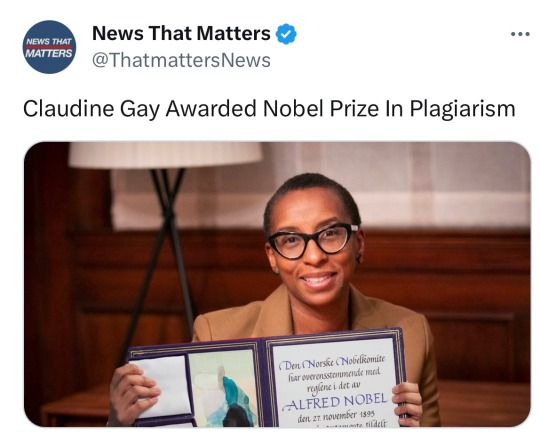
==
It is genuinely astonishing that this woman still has a job at all, never mind President of Harvard. This is why you never hire for diversity optics. When you don't make merit your number one priority, you have no idea if the person you're putting on is going to completely blow up your organization. And you can't get rid of them, because it looks like you're firing them because of their sex/race/etc., since you hired them for their sex/race/etc. in the first place.
#Aaron Sibarium#Claudine Gay#Claudine Gay is corrupt#plagiarism#Harvard#Harvard University#hypocrisy#academic fraud#academic integrity#academic corruption#religion is a mental illness
8 notes
·
View notes
Text
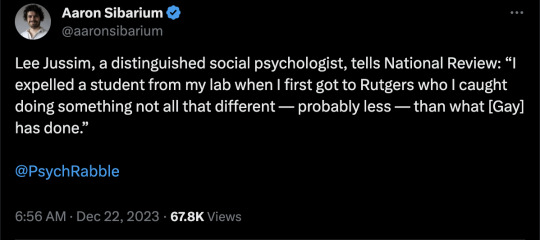
By: Ryan Hills and Zach Kessel
Published: Dec 21, 2023
Harvard and its president Claudine Gay are doing damage control amid an ongoing plagiarism scandal, with the embattled leader requesting even more corrections to her past work, this time her 1997 Ph.D. dissertation — the foundation of her academic career.
But the total of seven corrections requested so far still leave dozens of other instances of potential plagiarism unresolved. And scholars who believe their work was plagiarized have told National Review that they were never contacted by Harvard as part of its investigation into Gay’s academic work.
For instance, it does not appear that any of the corrections will address portions of Gay’s doctoral dissertation drawing heavily from the work of Vanderbilt University professor Carol Swain, in some cases reproducing her writing word-for-word without citation.
Swain — who has been outspoken about her feelings on the plagiarism scandal — told National Review that she is concerned with Harvard’s response to the revelations of its president’s academic-integrity issues.
“I have a problem with the way Harvard has reacted to the entire situation, because it seems like — with the assistance of some of their professors and other elites — they’re trying to redefine what is plagiarism,” Swain said, “and they’re making the argument that there are different levels and, by extension, that some of it is acceptable. That is a problem for higher education in America.”
A number of experts and academics contacted by National Review said that the examples of potential plagiarism that have been flagged are serious, and the large number of instances suggest a pattern.
Lee Jussim, a social psychologist and distinguished professor at Rutgers University, said he’s “never seen anything like” the plagiarism scandal involving Gay.
“I can tell you, I expelled a student from my lab when I first got to Rutgers who I caught doing something not all that different — probably less — than what she has done,” he said.
On Wednesday night, the Harvard Corporation announced that Gay is requesting three corrections to her dissertation. The requests come after news outlets published several examples that appear to show Gay failing to cite other researchers and in some cases using their language word-for-word in her dissertation without attribution.
The three corrections to her dissertation come after Gay previously requested four corrections in two of her academic articles.
The Harvard Corporation has not referred to any of Gay’s mistakes as plagiarism, but rather as instances of “inadequate citation” and “duplicative language without appropriate attribution.”
This week, National Review analyzed 30 of the disputed passages, which include many that remain unaddressed in the corrections that Gay has requested to date.
The 30 disputed passages arise from four publications: a 1993 history magazine, her 1997 Harvard dissertation, and two Urban Affairs Review journal articles from 2012 and 2017. In some of the cases, Gay appears to have put her citations in the wrong place or to have failed to put quotation marks around language she took verbatim from other academics. In other cases, she appears to have lifted large swaths of language from other researchers — including some of her Harvard colleagues — without any attribution at all.
Gay is even accused of lifting language from a Harvard colleague for the acknowledgement section of her dissertation.
Prominent academics, plagiarism experts, Harvard students, and the Boston Globe editorial board are now calling for Harvard to take an even closer look at Gay’s academic record, and to be clear about what, exactly, they find.
Harvard’s citation policies are clear that quotations be placed in quotation marks and cited, and that paraphrased material “be acknowledged completely.” The policies prohibit both “verbatim plagiarism”— failing to properly quote and cite specific language — and “mosaic plagiarism,” which involves copying bits and pieces from sources and changing some words “without adequately paraphrasing or quoting directly.”
“Taking credit for anyone else’s work is stealing, and it is unacceptable in all academic situations, whether you do it intentionally or by accident,” a Harvard policy states. The policy was much the same in 1997, when Gay wrote her doctoral dissertation.
The policy appears to be rigorously enforced against the students Gay presides over: During the 2020-2021 academic year, while Gay was serving as dean of Harvard’s Faculty of Arts and Sciences, 27 students were forced to withdraw from the university after being found in violation of the school’s academic-integrity policies, the Harvard Crimson reported.
The university first learned of the plagiarism allegations in late October from the New York Post, according to a summary of the Harvard Corporation’s review, portions of which were posted on X on Wednesday night by a reporter with The Chronicle of Higher Education. National Review has requested a copy of the summary from Harvard.
In a statement supporting Gay earlier this month, the fellows of Harvard College wrote that after they became aware of some of the allegations, they initiated “an independent review” of Gay’s published work by “distinguished political scientists.” The review revealed “a few instances of inadequate citation” but “no violation of Harvard’s standards for research misconduct.”
The statement was vague, and did not specify any specific problems with Gay’s work. Gay “proactively” requested four corrections to two articles from 2001 and 2017 “to insert citations and quotation marks that were omitted from the original publications,” according to the statement.
The review of the initial allegations was conducted by a three-member panel of experts who “have no ties to Harvard and are among the nation’s most respected political scientists,” according to a summary released on Wednesday..
A subcommittee of the Harvard Corporation, the university’s governing body, reviewed the rest of Gay’s published work, but didn’t initially review her dissertation, according to the summary. The subcommittee reviewed her dissertation only after media reports flagged potential issues.
The Harvard Corporation said in its summary of its review that Gay’s errors, including the citation errors in her dissertation, were “regrettable.”
“Neither the independent panel nor the subcommittee of the Corporation found evidence of intentional deception or recklessness in Gay’s work, which is a required element for a determination of research misconduct,” under the school’s governing policy, the summary states.
Harvard’s delay in identifying errors in Gay’s doctoral thesis “means that they, almost certainly, did not do a thorough review of her past work,” according to Jonathan Bailey, a plagiarism expert and consultant who publishes the website Plagiarism Today.
“It’s frustrating that Harvard (or even Gay herself) didn’t thoroughly investigate her prior works and, seemingly, just checked and responded to the initial allegations. They had an opportunity to get ahead of this and missed it,” Bailey said.
For Swain, the Vanderbilt University professor whose work Gay’s doctoral dissertation drew heavily from, Gay’s failure to adhere to ethical standards in something as foundational as her doctoral dissertation presents a significant problem for Harvard.
“To earn a doctorate, you have to have a dissertation that’s supposed to be original in some sort of way. You defend it and they hand you a doctorate, but they cannot hand you a doctorate for work that’s plagiarized,” Swain said in an interview with NR. “So that’s the bigger issue that they’re avoiding. And what they are hoping is that people who understand academia won’t raise those questions.”
The 30 plagiarism allegations provided to National Review appear to be the same ones that were previously provided to the Washington Free Beacon. On Tuesday, the Free Beacon reported on a handful of additional allegations against Gay, including alleged plagiarism in two more of her publications.
Attempts by National Review to reach Gay and a Harvard spokesperson on the phone and via email were unsuccessful this week.
‘Between Black and White’
The earliest allegations of plagiarism against Gay stem from a November 1993 article she wrote for a history magazine called Origins. Originally published by a Canadian firm, Origins is now a joint online publication of the Ohio State University and Miami University of Ohio history departments. Origins is not an academic journal.
Gay’s article, Between Black and White: The Complexity of Brazilian Race Relations, is six-pages long and focuses on the lack of collective political action by Afro-Brazilians. At the time, Gay was a recent graduate of Stanford University and a graduate student at Harvard.
Gay’s article doesn’t have any citations, but the piece includes a “Suggestions for Further Reading” section at the end, which mentions five works.
Of the 30 allegations of plagiarism against Gay reviewed by National Review, eleven of them came from her Origins article. In several cases, the language Gay uses in the article is similar to the language used by three other academics, two of whom she included in her suggested readings and one of whom was not mentioned at all.
For example, this paragraph from Gay reproduces language first used in an article by historian George Reid Andrews published a year earlier, but doesn’t attribute it to him. Gay included a book by Andrews in her suggested reading list.
Gay: It was a younger generation of Afro-Brazilians, many with one or more years of university education, that were among the first and most eager respondents to the MNU ‘s organizational call. Their eagerness was in large part a measure of the economic and political exclusion they had suffered under the military dictatorship.
As their numbers grew, it was their aspirations and rhetoric which came to define the organization. The movement became an expression of frustration among upwardly mobile Afro-Brazilians denied admission to the middle-class status to which their education and qualifications entitled them. To that extent, the aspirations of these activists were too removed from the lives of the poor to facilitate cross-class linkages.
Compare that to the language used by Andrews in his journal article.
Andrews: a younger generation of Afro-Brazilians, many with one or more years of university study, were starting to organise a new black movement in response to the economic and political exclusion which they were experiencing under the dictatorship. This movement, most vividly symbolised by the Movimento Negro Unificado, created in Sao Paulo in 1978 …
This new movement of the 1970s and 1980s was to a large degree the expression of frustration among upwardly mobile Afro-Brazilians denied admission to the middle-class status to which their education and qualifications entitled them. Its activists worked hard at recruiting support in the slums and favelas of the urban periferia, but their rhetoric and aspirations often seemed somewhat removed from the lives of poor and working-class blacks facing the immediate, grinding problems of poverty, crime and hunger.
In at least two cases, the language Gay used in her article is similar to the language that David Covin, an academic and activist, used in a 1990 journal article. Here is one example:
Gay: On June 18, 1978, representatives from a number of Afro-Brazilian organizations, outraged by a series of racially-motivated incidents, joined forces in Sao Paulo to form the Unified Movement Against Racial Discrimination (MUCDR).
As their first project, MUCDR organized a July 7, 1978 demonstration to protest two acts: (a) the April 28 beating death of black worker Robson Silveira da Luz, by a Sao Paulo policeman; and (b) the May expulsion of four young black athletes from the volleyball team of the Tiete Yacht Club because of their color. Two thousand people participated in the protest on the steps of the Municipal Theater. The organizers read an open letter to the population in which they outlined their campaign against “racial discrimination, police oppression, unemployment, underemployment and marginalization.”
Compare that to language used by Covin in his journal article from just a few years earlier:
Covin: The earliest manifestation of the MNU was the Unified Movement Against Racial Discrimination (MUCDR). Representatives from a number of Black organizations, entidades, met at the Center of Black Art and Culture in São Paulo on June 18, 1978. They resolved to create a movement to defend the Afro-Brazilian community against racial exploitation and human disrespect. They designated as their first activity a demonstration to be held at 6:30 p.m. on July 7, 1978, at the Chá viaduct in São Paulo. The demonstration was to protest two acts: (a) the torture and assassination of a Black worker, Robson Silveira da Luz, by policemen in São Paulo on April 28, 1978; and (b) the dismissal of four Black male children from the volleyball team of the Tiete Yacht Club in May, 1978, because of their color (Gonzalez, 1982, p. 43).
The demonstration was held on the designated date on the steps of the Municipal Theater of Sao Paulo. Two thousand people were present (Gonzalez, 1982, p. 48). An open letter to the population was read.
Gay did not cite Covin or include his work in her suggested reading list.
Harvard looked into Gay’s Origins article as part of its initial investigation but determined that it did not merit correction since the article is 30 years old and the journal generally did not require citations or quotations, according to the summary of its investigation.
Bailey, the plagiarism expert and consultant, called the lack of citations but the inclusion of a suggested reading list in the Origins article “weird.”
Steven McGuire, an advocate for free expression and a fellow with the American Council of Trustees and Alumni, said that not understanding the magazine’s citation standards makes it harder to judge, but it’s notable because similar issues continue to pop up in Gay’s later work, including in her dissertation.
“There seems to be a consistent or ongoing pattern there of at least sloppiness that meets the definition of plagiarism that just doesn’t seem to be acceptable for a professional scholar, let alone someone who is president of one of our most elite academic institutions in this country,” he said.
Benjamin Johnson, a Ohio State University spokesman, said the university has not heard from anyone at Harvard about amending the article, which remains online.
‘Taking Charge’
The 30 allegations of plagiarism reviewed by National Review include three from Gay’s 1997 dissertation, “Taking Charge: Black Electoral Success and the Redefinition of American Politics.”
In at least two cases, Gay is accused of cribbing language without attribution from Bradley Palmquist, an assistant professor of government at Harvard at the time, and from Stephen Voss, who was a colleague in her Ph.D program. One example includes language that is almost identical to language used by Palmquist and Voss in a paper presented just a year earlier.
Gay: The idea behind the “method of bounds” is that the beginning point for any ecological inference should be the knowledge a researcher has for certain. This knowledge includes the fact that any proportion is by definition bound by 0 and 1. Furthermore, the marginals of a table, Xi (black population density) and Ti (total turnout) dictate the minimum and maximum possible values of the cells in the table. King’s method makes direct use of this information to establish absolute bounds on the values of the quantities of interest.
Compare that to a similar paragraph from Palmquist and Voss.
Palmquist and Voss: The beginning point for any ecological inference should be with the knowledge we have for certain. Almost from the beginning of methodological work in this area, researchers have used the fact that proportions must by definition be between 0 and 1 (Duncan, Cuzzort, and Duncan 1961; Achen and Shively 1995). Recently, Gary King (n.d.) has emphasized the particular advantages of using the precinct-by-precinct constraints. Making direct use of this information to establish absolute (i.e. not probabilistic) bounds on the percentages of the internal cells is entirely straightforward. For any single table (either of a precinct or of a the [sic] state as a whole), the marginals dictate a minimum and maximum possible value for each of the cells.
Gay has requested to add “quotations and/or citations” to portions of her dissertation drawn from Palmquist and Voss, according to Harvard.
In an interview with National Review before Gay requested the corrections to her dissertation, Voss said he did not believe all the allegations of plagiarism against Gay were clear cut and added that he did not take personal offense. He did not publish his paper but presented it at a conference, he said, and the content in question often involved technical language. But, he said, his examples are “considered the smoking gun.”
“We’re not even cited, so a lot of the justifications people have been giving for what Claudine did don’t apply to my paper,” Voss said. “Things like, ‘well, she cited it but just not near where she was using their words,’ or, ‘she quoted them but didn’t point out that these other things were quotes too,’ all these sorts of excuses that were given don’t apply to mine.”
Voss said no one at Harvard gave him a heads up about the allegations of plagiarism or their review of those allegations.
“I’ve not heard from Claudine Gay, and in fact not heard from anyone at Harvard, either when they conducted their investigation or, you know, someone in their public-relations office to try to coach me on how to answer,” Voss said. “I have literally not heard from a single person at Harvard University since this story emerged.”
Gay also is accused of lifting language from a Harvard colleague in her dissertation’s acknowledgment section. In her acknowledgement, Gay wrote that she is grateful to her advisor, professor Gary King, who “reminded me of the importance of getting the data right and following where they lead without fear or favor.” She also thanked her family, “who drove me harder than I sometimes wanted to be driven.”
Jennifer Hochschild, who was a professor at Princeton at the time and who is now at Harvard, used those same phrases in the acknowledgements of a paper she published a year earlier.
Hochschild downplayed the importance of what she said were minor errors on Gay’s part, telling National Review that Gay simply recycled “standard phrases that we all use in acknowledgements.”
“There’s obvious political and ideological — as well as substantive — reasons behind this whole thing, and I wish to hell she’d been more careful,” Hochschild said. “But I think we have more interesting issues to worry about, and I wish you guys were worried about more interesting issues. It’s not quite making a mountain out of a molehill, but a different person in a different context and different political temperature would be treated differently.”
Like Voss, Hochschild told National Review that no one from Harvard reached out as part of their investigation into Gay’s record; she only learned of the allegation when a reporter reached out.
Redefining Plagiarism?
Earlier this month, journalists Christopher Rufo and Christopher Brunet published additional allegations of plagiarism in Gay’s dissertation. They found at least three problematic patterns of usage and citation in Gay’s dissertation, they said.
According to Rufo’s and Brunet’s reporting, Gay appears to have taken language and ideas from Swain, the former Vanderbilt professor. Gay’s dissertation contains nearly word-for-word reproduction of passages from her 1995 book, Black Faces, Black Interests: The Representation of African Americans in Congress.
A feature in the September-October 2023 issue of Harvard Magazine titled A Scholar’s Scholar tracks Gay’s career in celebration of her July 2023 ascendancy to the university’s highest leadership position. Her dissertation is described in the piece as having included “significant findings,” but Swain believes the work simply drew from her own research, for which she was never credited.
“That article specifically mentions the areas where her research was so significant, and those were the areas that my research sort of pioneered,” Swain said. “I looked at some of her articles [after the initial allegations] and there was one in particular — in the American Political Science Review — on descriptive representation. I would have expected her to engage my work, to put a citation in the article, because she was building on ideas that came directly from my research.”
Swain said she learned that Gay appeared to have copied her language and ideas after Rufo’s initial thread on X bringing the allegations to light. The university did not contact her over the course of its clandestine investigation into Gay’s writings, which was only brought to light as a result of reporting on the similarities between the Harvard president’s published work and that of academics like Swain.
‘Moving to Opportunity’ & ‘A Room for One’s Own’
There are at least 16 allegations of plagiarism in two of Gay’s Urban Affairs Review journal articles, Moving to Opportunity: The Political Effects of a Housing Mobility Experiment from 2012, and A Room for One’s Own? The Partisan Allocation of Affordable Housing from 2017.
In both cases, Gay is accused of not putting quotation marks around direct quotes and of putting citations in the wrong place – in some cases, she appears to have cited a source on one page, but then fails to cite them when she uses their information again pages later.
In A Room for One’s Own? for example, she cites the work of her Harvard Colleagues, Stephen Ansolabehere and James Snyder Jr., on one page of her 30-page paper, but doesn’t cite them again, even when she seems to use their language and work later in her paper.
For example, Gay’s paper reads:
Gay: Theory predicts an interaction between county partisanship and party control, such that the more Democratic a county, the more LIHTC allocations it should receive when the state is under Democratic control; if the relationship is symmetrical, as Hypothesis 1 predicts, a more Republican county should benefit when the state is under Republican control
Compare that to language in Ansolabehere and Snyder’s paper from 2006:
Ansolabehere and Snyder: Theoretical arguments predict an interaction between partisanship of voters and party control of state government. Democratic counties are expected to receive more transfers when the state is under Democratic control than when the state is under Republican control; and Republican counties should receive more transfers when the state is under Republican control.
In A Room for One’s Own, Gay also uses language that appears to be drawn from a previous paper by Miami University professor Anne Williamson, who told the Post she was “angry” when she first learned that Gay had relied on her work without citation.
Contacted after Harvard announced the initial corrections, Williamson told National Review she was “satisfied that Dr. Gay has pledged to add appropriate quotation marks and citations to articles where she may have inadvertently drawn on my work (and the works of others) without attribution.”
Several academics who have reviewed the allegations and spoke to National Review said they believe that at least some of the allegations clearly constitute plagiarism.
“If you take the material altogether, it seems to me likely that a student who would have been subjected to disciplinary action for failing properly to quote and credit,” Robert George, a Princeton professor, said in an email.
Bailey, the plagiarism expert, agreed that at least some of the allegations “are serious and I would want investigated. The cribbing of Palmquist and Voss’s language stood out, he said. However, he doesn’t believe that several others rise to that level.
“A lot of these didn’t show anything to me other than two writers talking about the same topic in somewhat similar ways,” he said.
Harvard, he said, should be more transparent, including releasing the results of the review its panel already conducted.
“That sounds like a minimal thing to expect,” Jussim, the Rutgers professor, said. “At this point, someone probably should go through everything she’s written, because who knows if all of it has even been uncovered.”
Ultimately, he said, he suspects Gay will be protected. Most high-level university administrators are “not really there for their scholarship,” he said, and that likely includes Gay.
If advancing ideology is Gay’s primary mission as Harvard president, he said, “who cares about any of this?”
A Double Standard?
Harvard has a track record of punishing students for plagiarism in accordance with its official policy, but the prospect of selective treatment for high-profile faculty members and administrators has been raised before.
A 2005 Harvard Crimson editorial complains of a “woeful double standard” between the expectations for students and for faculty, pointing to professor Laurence H. Tribe’s failure “to credit text lifted verbatim from Henry J. Abraham’s book ‘Justices and Presidents’” in his own 1985 “God Save This Honorable Court.”
“For the public face of Harvard and for internal relations as well,” the editors wrote at the time, “it is crucial that the university maintain more consistent disciplinary rules for instances of academic dishonesty.”
In fall 2022, the Harvard Crimson reported that, during the 2020-2021 academic year, 27 students were forced to withdraw from the university after being found in violation of the school’s academic-integrity policies. Ninety-nine of the 138 cases the university’s “Honor Council” reviewed during that period were found to be legitimate instances of academic dishonesty. The academic year on which the Crimson reported coincides with Gay’s time overseeing graduate and undergraduate studies as dean of Harvard’s Faculty of Arts and Sciences.
“I don’t know how Harvard thinks that this situation is currently tenable,” McGuire said. “What Claudine Gay has done appears to violate the standards that they hold their own students to. And Harvard has not even come out and said it’s plagiarism.”
[ Via: https://archive.md/sFCA0 ]
==
The fact that Harvard invented the Newspeak term "duplicative language" specifically to mask their presidents plagiarism is a good indicator of how compromised the school is.
#Claudine Gay#Claudine Gay scandal#plagiarism#duplicative language#language games#corruption of education#higher education#tertiary education#ideological corruption#Claudine Gay is corrupt#Harvard#Harvard University#religion is a mental illness
6 notes
·
View notes
Text
youtube
Harvard Canceled its Best Black Professor. Why?
I originally shared this video over 20 months ago, and then again back in June 2022.
But given the given the current scandals surrounding higher education in the US, and specifically around Harvard University - as if race-based admissions weren't bad enough - it's worth a look back at just one of the scandals its current - but likely outgoing - president, Claudine Gay, was at the center of: the cancelation of Roland Fryer entirely for reasons of protecting her own fraudulent, race-baiting career from his rigorous data-driven research.
This is just one. She has a long history of corruption, including canceling other academics, and producing plagiarized and fake scholarship herself.
#Harvard University#Roland Fryer#Claudine Gay#diversity hire#DEI#diversity equity and inclusion#DEI hire#Claudine Gay is corrupt#unethical#ideological corruption#academic corruption#religion is a mental illness
4 notes
·
View notes
Text
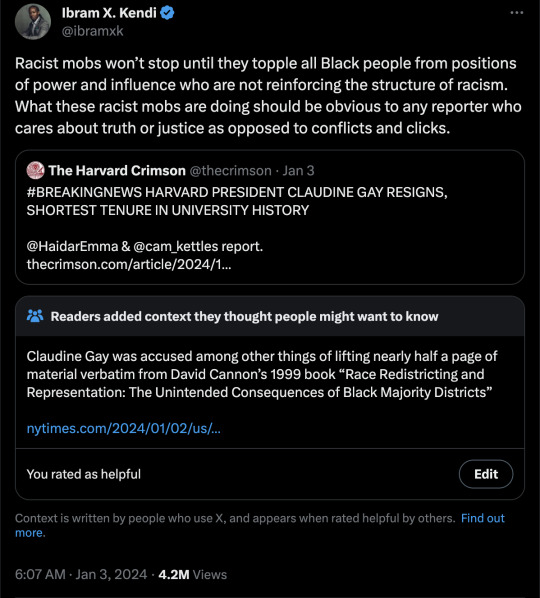
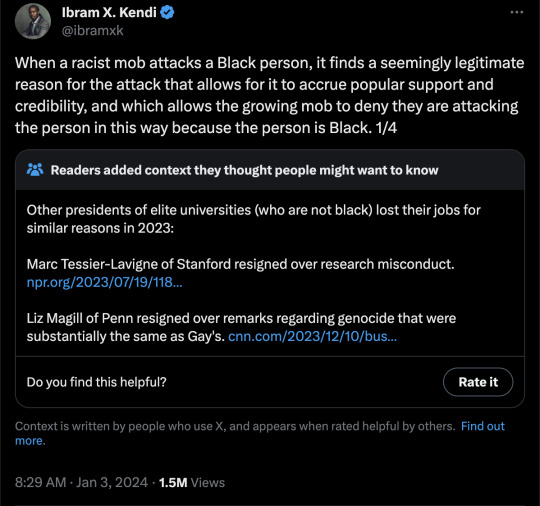
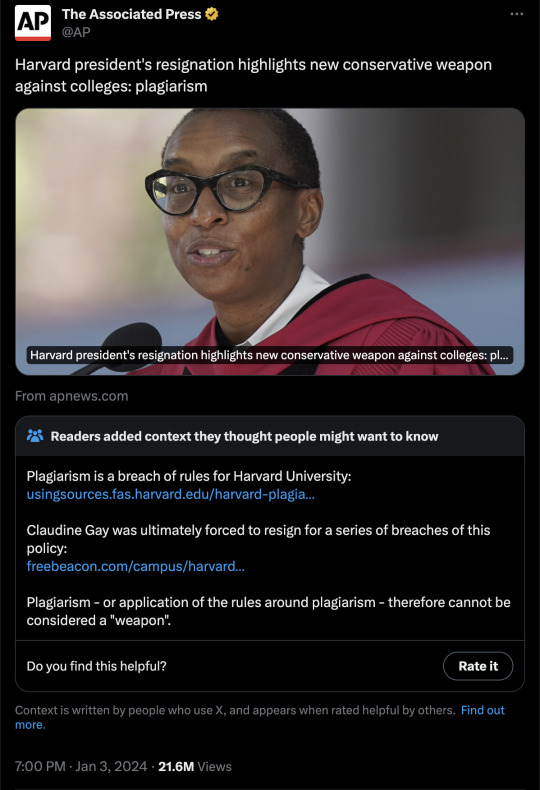
It's not so long ago that compulsive liars and race-grifters like Kendi could get away with being fact-checked somewhere down in the depths of the replies where few people would see, and it would rely on people retweeting to surface the refutation upwards. He could propagate whatever manufactured victimhood narrative he wanted, and he could get away with it for the most part.
Community Notes has changed everything.
It's interesting that subjective reality - "my truth" - and "equity" - unequal treatment to create desired outcomes - have become so entrenched that something like, "apply the rules on cheating consistently," is being called a "weapon."
Claudine Gay is entirely responsible for her own downfall.
#Ibram X. Kendi#Harvard University#Harvard#Claudine Gay#Claudine Gay scandal#race card#plagiarism#academic fraud#academic corruption#rampant dishonesty#Community Notes#Community Notes for the win#religion is a mental illness
16 notes
·
View notes
Note
On your post about ex-Harvard president Gay-
This person cheated her way to the top. She took the place of someone who would actually be qualified. I’m certain Harvard has a no plagiarism policy, so she’s enforcing rules on people that she broke and benefited from.
Any other presidents who were/are found to commit the same violation should receive the same punishment.
When comments are made such as ‘this is meant to humble black women’ or that merit is an arbitrary standard, lowers the bar for the community as a whole. There are PLENTY of black women who are intelligent, strong leaders, highly qualified, etc, and she took that position from someone who worked for it and deserved it. To state racism as the reason for her stepping down implies that because she is a black woman, we have to overlook some merit items and academic violations. How is that not racist in itself? There are black women who can do the job competently without having cheated to get there and she took that spot from them. She is the ONLY person to blame for her downfall and to imply otherwise hurts people who could have succeeded in this role.
This is entirely correct.
They can't claim that "society is racist" as the reason Claudine Gay was dethroned, when that same society facilitated her rise in the first place. It's like thanking god for the good things but not blaming god for the bad things... only, sort of inverted.
One of the angry Tweets from Marc Lamont Hill was:
The next president of Harvard University MUST be a Black woman.
This is literally the same diversity-hire attitude that got Harvard into this mess in the first place.
But let's roll with this. How about Carol M. Swain? She's a black woman. She's one of the people Claudine Gay stole from, so if they liked Gay's "scholarship," what they actually liked incorporated Swain's ideas. Swain is also a conservative and a Xian, though. So, what are the chances? When they say "diversity," what they really mean is "ideological conformity."
Any other president would not have been so well insulated or protected. Bob Casten resigned as President of the University of South Carolina after remarks from one commencement speech he gave included plagiarized content.
https://edition.cnn.com/2021/05/14/us/plagiarism-commencement-speech-south-carolina/index.html
The resignation of University of South Carolina president Bob Caslen for plagiarizing remarks in a commencement speech is the most recent example of the awkwardness faced by educators and school leaders when higher-ups find inspiration in the wrong ways.
Caslen resigned from his position Wednesday after admitting his commencement speech plagiarized portions of a speech given by the former head of US Special Operations Command, retired Navy Adm. William McRaven.
“I was searching for words about resilience in adversity and when they were transcribed into the speech, I failed to ensure its attribution. I take full responsibility for this oversight,” Caslen wrote in a letter to students obtained by CNN affiliate WIS.
One speech. Not even scholarship. Not research. A single speech. Not only that, but he took responsibility. He said, the buck stops with me.
Harvard was still backing Gay when the total accusations was up to 40. And Gay's resignation letter demonstrates no responsibility, and only entitlement and deflection. If you've seen the Roland Fryer video, this is completely on brand for someone as corrupt as her.
She was't outsted because she's a black woman. She was protected because she's a black woman. This is the gaslighting that they do. Gay and Harvard are the villains. As you mentioned, she stole a prestigious position from someone else. Could have been a black woman, could have been a white man. Doesn't matter. She stole a position someone else was more qualified to take.
And Harvard facilitated this fraud. And it was fraud. It's literally academic fraud. There were murmurs in corridors for years about Gay's scholarship long before it was ever exposed. But Harvard didn't address it, and when they were pressured to in this most recent blow-up, they faked an "investigation" that found only minor issues with quotation marks. It seems much more like not only they knew, but actively facilitated it. It's extremely hard to believe that, given this goes all the way back to her dissertation, they were completely unaware of this pervasive fraud, and much more likely they were not only aware, but colluded.
Gay and Harvard are the villains. But this is the DARVO - Deny, Attack, Reverse Victim and Offender - that they do. You're supposed to feel guilty for noticing their malfeasance. You don't need to. And it's so blatant this time that I think this might even be a tipping point in some way. People are completely fed up with being manipulated. But that's "Diversity, Equity and Inclusion"'s entire game.
#ask#Claudine Gay#Claudine Gay scandal#academic corruption#Harvard#Harvard University#plagiarism#academic fraud#diversity equity and inclusion#diversity#equity#inclusion#corruption of education#religion is a mental illness
15 notes
·
View notes
Text
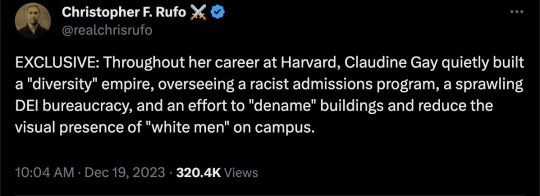
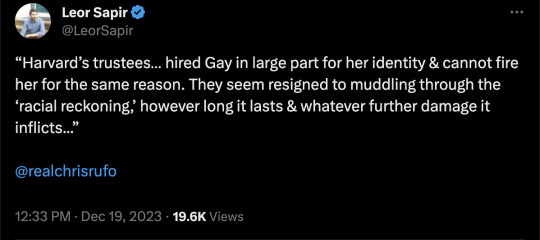
By: Christopher F. Rufo
Published: Dec 18, 2023
Harvard president Claudine Gay has been embroiled in controversy for minimizing Hamas terrorism and plagiarizing material in her academic work on race. Both scandals have discredited her presidency, but neither should come as a surprise. Throughout Gay’s career at Harvard—as professor, dean, and president—racialist ideology has driven her scholarship, administrative priorities, and rise through the institution.
Over the course of her career, Gay quietly built a “diversity” empire that influenced every facet of university life. Between 2018 and the summer of 2023, as the dean of the largest faculty on campus, Gay oversaw the university’s racially discriminatory admissions program, which the Supreme Court found unconstitutional. Even after the court issued its ruling earlier this year, Gay said that it was a “hard day” and defended the university’s policies, which were deemed discriminatory against Asian and white applicants. Gay promised to comply with the letter of the law, while remaining “steadfast” in her commitment to producing “diversity”—a not-so-subtle message that Harvard would find a way, as the University of California has done, to evade the law in practice.
While affirmative action has been a longstanding practice at Harvard, other programs led by Gay were new. Following the death of George Floyd in 2020, Gay commissioned a Task Force on Visual Culture and Signage, which released a series of recommendations the following year for engaging in the “historical reckoning with racial injustice.” The recommendations included a mandate to change “spaces whose visual culture is dominated by homogenous portraiture of white men.” In particular, the report maintained, administrators should “refresh” the walls of Annenberg Hall, which “prominently display a series of 23 portraits, none of [which] depict women, and all but three of [which] depict white men.” Who were these white men and why were they honored in the first place? The report does not say—their race and sex alone provided sufficient justification for their banishment.
In 2022, Gay implemented an initiative at the Faculty of Arts and Sciences for “denaming” any “space, program, or other entity” deemed racist by the faculty and administration. According to the report, commissioned by then-president Lawrence Bacow, these decisions would be “based on the perception that a namesake’s actions or beliefs were ‘abhorrent’ in the context of current values.” In other words, Harvard would use the standards of present-day social-justice activism to pass judgment on men who lived hundreds of years prior—at best, an ahistorical and deeply ambiguous method. As part of this project, Gay sent an email to the Faculty of Arts and Sciences community soliciting “requests for denaming,” promising to address the situation “through the lens of reckoning.” Since then, the university has grappled with denaming multiple buildings, including Winthrop House, named after John Winthrop, governor of the Massachusetts Bay Colony, and his great grandson, also John Winthrop, a Harvard professor and president.
As president, Gay leads a sprawling DEI bureaucracy—officially, the Office of Equity, Diversity, Inclusion, and Belonging—that seeks to influence how students speak, think, and behave in relation to race. Though the university deleted nearly all DEI materials from its website following President Gay’s disastrous congressional testimony related to the Hamas terror attack, I have recovered some of these documents through an Internet archive. Harvard’s DEI administrators encourage students to internalize the basic narrative of critical race theory: America is a nation defined by “systemic racism,” “police brutality,” “white supremacist violence,” and the “weaponization of whiteness.” In another resource, students were invited to “unpack” their “white privilege” and “male privilege,” and to consider their “white fragility,” which stems from “the privilege that accrues to white people living in a society that protects and insulates them from race-based stress.”
What is one to make of Gay’s record as a whole? She is hardly a “scholar’s scholar,” as the university magazine tried to portray her, having published, according to her curriculum vitae, just 11 academic papers—nearly half of which include plagiarized material. Nor is she a competent administrator, having botched the response to rampant anti-Semitism on campus and, by one estimate, lost the university more than $1 billion in donations. But she plays one role perfectly: the dutiful racialist, skilled at the manipulation of guilt, shame, and obligation in service of institutional power. For instance, she wrote last year in a message to the campus announcing a report on Harvard’s historical connection to slavery: “We have been excluded and denigrated for centuries from an institution where we now work, study, and lead. Our presence here should not feel so extraordinary. But now we see it was anything but inevitable.”
The irony: Gay was, in fact, somewhat inevitable. In the long season of racial guilt and animus that followed George Floyd’s death, the university was desperate to recruit a “first,” as Gay put it in her inaugural address, and disrupt the university’s nearly 400 years of whiteness. As Harvard is now learning, however, naming as president someone who sees race and sex not as incidental human attributes but as ideological constructions that must be imposed on the institution comes with a significant downside. Consequently, Harvard’s trustees find themselves in a bind: they hired Gay in large part for her identity and cannot fire her for the same reason. They seem resigned to muddling through the “racial reckoning,” however long it lasts and whatever further damage it inflicts on America’s oldest university.
#Christopher F. Rufo#Christopher Rufo#Claudine Gay#DEI hire#diversity hire#DEI bureaucracy#Harvard#academic corruption#diversity equity and inclusion#diversity#equity#inclusion#religion is a mental illness
11 notes
·
View notes
Text




By: Aaron Sibarium
Published: Jan 30, 2024
It's not just Claudine Gay. Harvard University's chief diversity and inclusion officer, Sherri Ann Charleston, appears to have plagiarized extensively in her academic work, lifting large portions of text without quotation marks and even taking credit for a study done by another scholar—her own husband—according to a complaint filed with the university on Monday and a Washington Free Beacon analysis.
The complaint makes 40 allegations of plagiarism that span the entirety of Charleston's thin publication record. In her 2009 dissertation, submitted to the University of Michigan, Charleston quotes or paraphrases nearly a dozen scholars without proper attribution, the complaint alleges. And in her sole peer-reviewed journal article—coauthored with her husband, LaVar Charleston, in 2014—the couple recycle much of a 2012 study published by LaVar Charleston, the deputy vice chancellor for diversity and inclusion at the University of Wisconsin-Madison, framing the old material as new research.
Through that sleight of hand, Sherri Ann Charleston effectively took credit for her husband's work. The 2014 paper, which was also coauthored with Jerlando Jackson, now the dean of Michigan State University's College of Education, and appeared in the Journal of Negro Education, has the same methods, findings, and description of survey subjects as the 2012 study, which involved interviews with black computer science students and was first published by the Journal of Diversity in Higher Education.

The two papers even report identical interview responses from those students. The overlap suggests that the authors did not conduct new interviews for the 2014 study but instead relied on LaVar Charleston's interviews from 2012—a severe breach of research ethics, according to experts who reviewed the allegations.
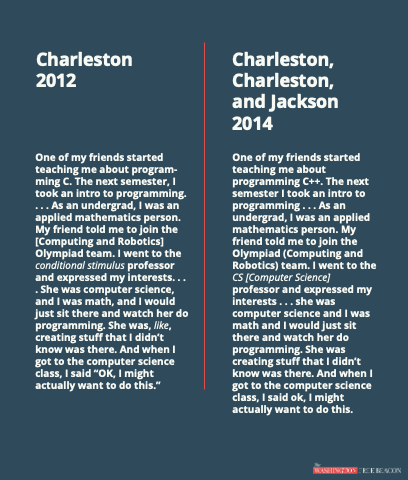
"The 2014 paper appears to be entirely counterfeit," said Peter Wood, the head of the National Association of Scholars and a former associate provost at Boston University, where he ran several academic integrity probes. "This is research fraud pure and simple."
Sherri Ann Charleston was the chief affirmative action officer at the University of Wisconsin-Madison before she joined Harvard in August 2020 as its first-ever chief diversity officer. In that capacity, Charleston served on the staff advisory committee that helped guide the university's presidential search process that resulted in the selection of former Harvard president Claudine Gay in December 2022, according to the Harvard Crimson.
A historian and attorney by training, Charleston has taught courses on gender studies at the University of Wisconsin, according to her Harvard bio, which describes her as "one of the nation's leading experts in diversity." The site says that her work involves "translating diversity and inclusion research into practice for students, staff, researchers, postdoctoral fellows and faculty of color."
Experts who reviewed the allegations against Charleston said that they ranged from minor plagiarism to possible data fraud and warrant an investigation. Some also argued that Charleston had committed a more serious scholarly sin than Gay, Harvard's former president, who resigned in January after she was accused of lifting long passages from other authors without proper attribution.
Papers that omit a few citations or quotation marks rarely receive more than a correction, experts said. But when scholars recycle large chunks of a previous study—especially its data or conclusions—without attribution, the duplicate paper is often retracted and can even violate copyright law.
That offense, known as duplicate publication, is typically a form of self-plagiarism in which authors republish old work in a bid to pad their résumés. Here, though, the duplicate paper added two new authors, Sherri Ann Charleston and Jerlando Jackson, who had no involvement in the original, letting them claim credit for the research and making them party to the con.
"Sherri Charleston appears to have used somebody else's research without proper attribution," said Steve McGuire, a former political theory professor at Villanova University, who reviewed both the 2012 and 2014 papers.
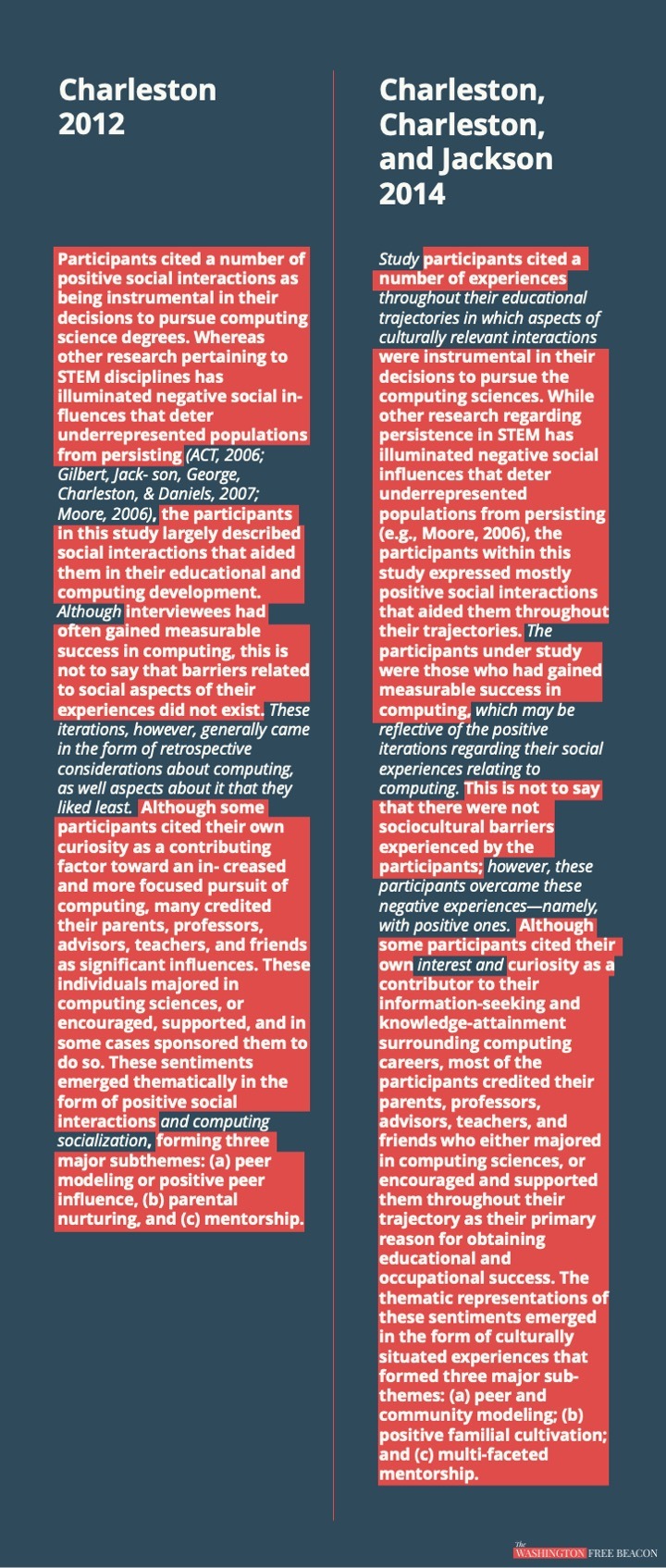
One-fifth of the 2014 paper, including two-thirds of its "findings" section, was published in the 2012 study, according to the complaint, and three interview responses are identical in both articles, suggesting they come from the same survey.
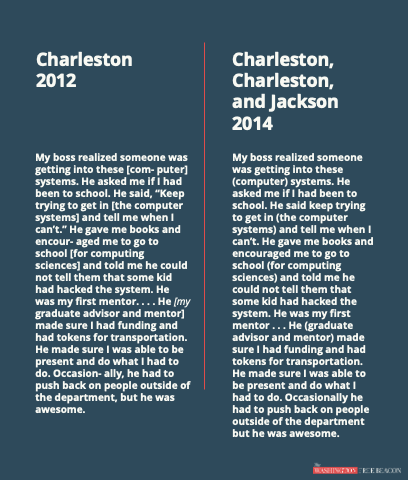
According to Lee Jussim, a social psychologist at Rutgers University, "it is essentially impossible for two different people in two different studies to produce the same quote." At best, he said, the authors got their wires crossed and mixed up interviews from two separate surveys, both of which just happened to involve 37 participants with the exact same demographic profile. At worst, the authors committed data fraud by framing old survey responses as new ones—a separate and more serious offense.
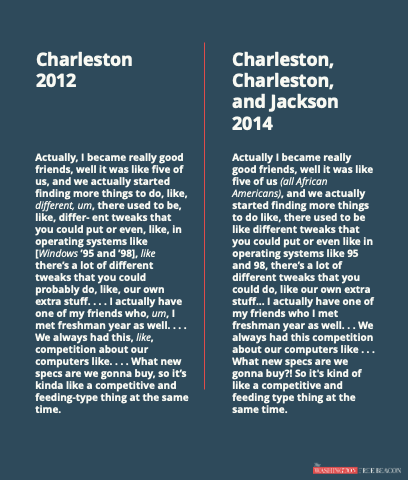
The Journal of Negro Education did not respond to a request for comment. Sherri Ann Charleston, LaVar Charleston, and Jerlando Jackson did not respond to requests for comment.

Monday's complaint, which was filed anonymously, comes as Harvard is facing questions about the integrity of its research affiliates and the ideology of its diversity bureaucrats, most of whom report to the sprawling office that Sherri Ann Charleston oversees.
The Dana-Farber Cancer Institute, one of Harvard Medical School's three teaching hospitals, announced in January that it would retract six papers and correct dozens more after some of its top executives were accused of data manipulation. That news came on the heels of a viral essay in which Carole Hooven, a Harvard biologist, described how she had been hounded out of a teaching role by her department's diversity committee after she said in an interview that there are only two sexes.
The school is also facing an ongoing congressional probe over its handling of anti-Semitism and its response to the plagiarism allegations against Gay, which Harvard initially sought to suppress with legal saber-rattling. Half of Gay's published work contained plagiarized material, ranging from single sentences to entire paragraphs, with some of the most severe lifts coming in her dissertation. Though Gay stepped down as president on January 2, she remains a tenured faculty member drawing a $900,000 annual salary.
Some of Charleston's offenses are similar to Gay's. In her 2009 dissertation, for example, Charleston borrows a sentence from Eric Arnesen's 1991 book Waterfront Workers of New Orleans: Race, Class, and Politics, 1863-1923, without quotation marks and without citing Arnesen's work in a footnote.
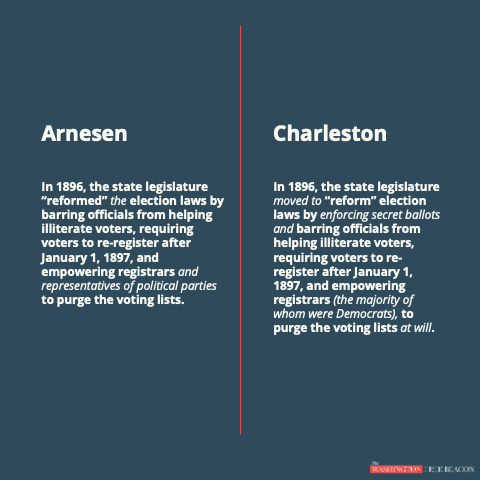
She also lifts full paragraphs from her thesis adviser, Rebecca Scott, while making minimal semantic tweaks.
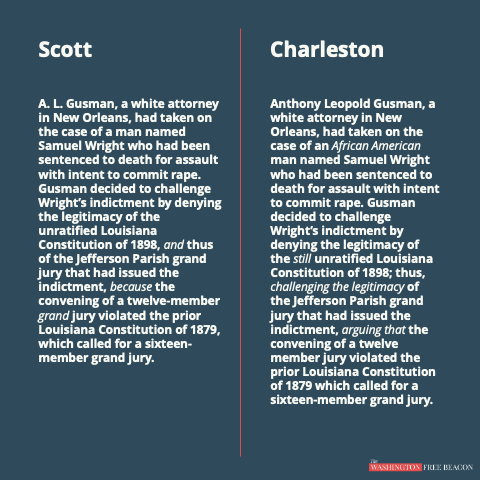
"There's simply not enough difference to consider them original words," said Jonathan Bailey, the founder of the website Plagiarism Today. "Though the sources in those examples are cited"—Charleston includes a footnote to Scott at the end of each passage—"the text either needed to be quoted or properly paraphrased."

Bailey added that the plagiarism of Scott alone merited an investigation—ideally, he said, "by a neutral party with no ties to either the school or the school's critics."
Harvard did not respond to a request for comment. Scott and Arnesen did not respond to requests for comment.
Charleston also lifted language from Louis Pérez, an historian at the University of North Carolina-Chapel Hill; Alejandro de la Fuente, an historian at Harvard; and Ada Ferrer, an historian at New York University, among other scholars.
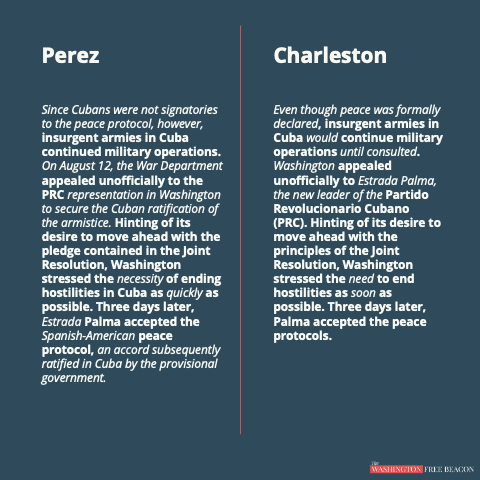
Charleston cites each source in a footnote but omits quotation marks around language copied verbatim. The omissions violate Harvard's Guide to Using Sources, a document produced for incoming students, which states that quotation marks are required when "you copy language word for word."
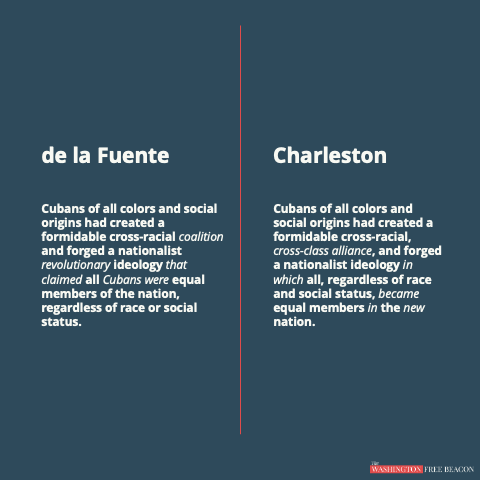
Pérez, de la Fuente, and Ferrer did not respond to requests for comment.

The range of examples presented in the complaint, which was also filed to the University of Michigan and the University of Wisconsin-Madison, highlights how plagiarism can shade into more severe forms of misconduct when it involves interviews or other data.
In fact, some experts said the term "plagiarism" didn't quite capture the dishonesty of duplicate publication, which is sometimes categorized as a separate offense and accounts for 14 percent of all paper retractions in the life sciences.
"You cannot just republish an old paper as if it is a new paper," Jussim, the Rutgers psychologist, said. "If you do, that is not exactly plagiarism; it's more like fraud."
Wood said the case was really a combination of the two offenses. "Because the second paper, on which Sherri Ann Charleston is one of the three co-authors, recycles so much of the text of the original paper by LaVar J. Charleston, this does have the earmarks of plagiarism, but the plagiarism is compounded by an even larger effort to deceive," he said. "The universities and journals need to investigate."
While scholars can reuse data across multiple papers, they must make clear when they are doing so and provide appropriate attribution to earlier studies, per guidelines from the Office of Research Integrity and the editorial policies of top academic journals, including Nature and Cell.
But the 2014 paper never indicates that it is reusing research from 2012. Instead, it claims to present new data that fill a "gap" in the literature and "corroborate" the 2012 study, among others, and on two occasions refers to survey subjects as "participants in this study."
Those participants appear to be the same people whom LaVar Charleston interviewed in 2012. Both surveys involved the same number of undergraduates, graduate students, Ph.D.s, and students at historically black colleges—all drawn from the same computer science conference—a similarity that experts said was a red flag.
"It is curious that the proportions are identical," said Debora Weber-Wulff, a German computer scientist who researches plagiarism and other forms of academic misconduct. "This would be grounds for the universities in question to request the data and investigate."
Jussim agreed. "This seems sufficiently improbable that, absent something saying they are re-reporting an already-published study, it would be fraud," he said.
LaVar Charleston did not respond to a request for comment about whether the two studies used the same interviews. The University of Michigan said it was "committed to fostering and upholding the highest ethical standards in research and scholarship," but declined to comment on the complaint. The University of Wisconsin-Madison told the Free Beacon it had "initiated an assessment in response to the allegations."
The main difference between the papers is a long section in the 2014 article about "culturally responsive pedagogy theory," which the authors say their findings support. Both articles are littered with the tropes of progressive scholarship, including a disclaimer about "positionality"—the authors assure readers that they reflected on their own "racial, gender, and socioeconomic status"—and a lament that computer science is a "White male-dominated field."
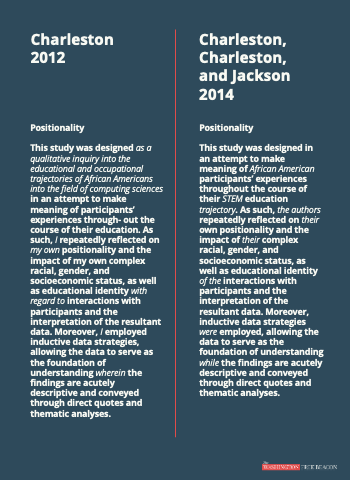
Both also criticize the idea that "computing sciences is for nerds, only for White people, [and] only for geniuses."
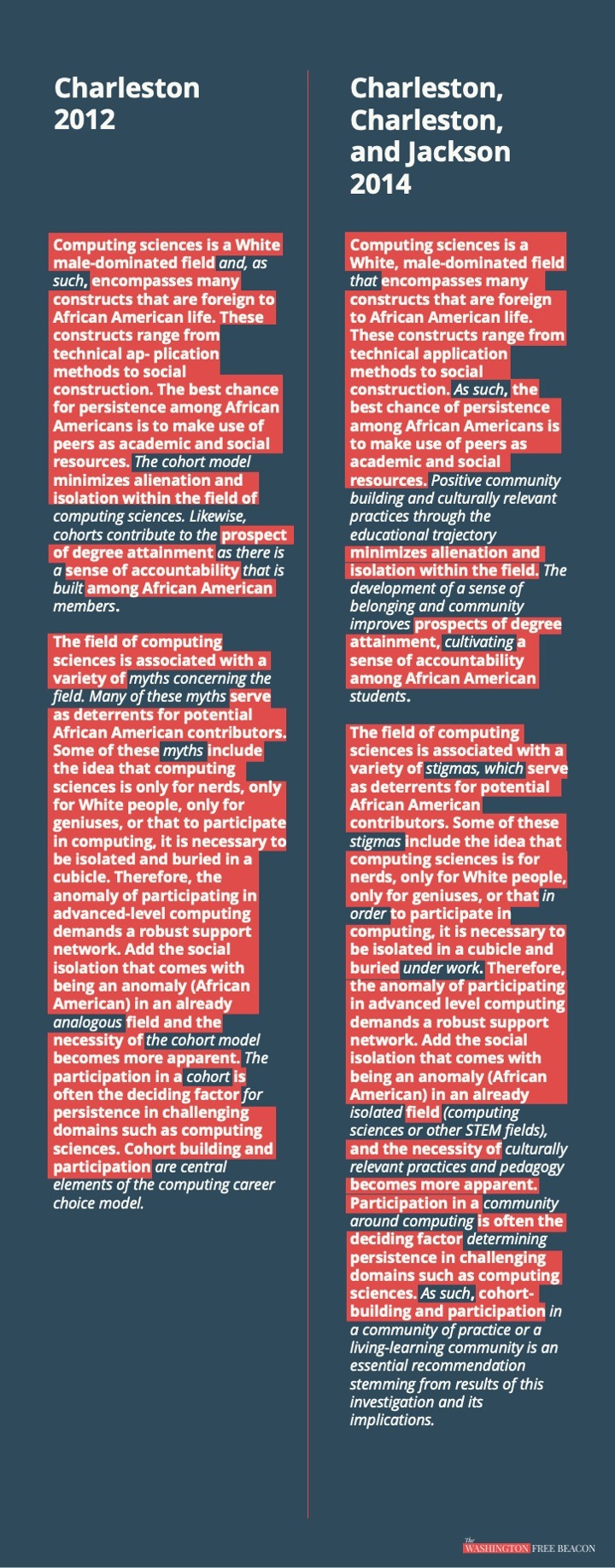
Such language is typical of the diversity initiatives Charleston oversees. Since 2020, her office has pumped out a stream of materials that bemoan the "weaponization of whiteness," discuss the ins and outs of "white fragility," and urge students to "call out" their peers for "harmful words." One message, signed by Charleston herself, was titled "A Call to Dismantle Intersecting Oppressions."
"We must continue to work against systematic oppression in all its forms—racism, sexism, homophobia, ableism, and more," she wrote.
Her office also curates resources for students seeking to become fluent in progressive patois, including a "glossary of diversity, inclusion and belonging (DIB) terms" that provides examples of "gaslighting."
Tactics can include "shooting down the target's ideas," the entry reads—or "taking credit for them."
==
Here we go again...
If you haven't already figured it out, the DEI-related faux-"disciplines" - the "Studies": Ethnic Studies, Women's Studies, Gender Studies, Postcolonial Studies, Media Studies, etc - are the most corrupt, the most ideological with the absolute lowest academic standards of all. All they care about is echoing back the "correct" opinions, not valid scholarship.
And yet, somehow these lunatics and fanatics end up the most powerful people in the asylum.
Harvard needs to fumigate the house, top to bottom.
#Aaron Sibarium#Sherri Ann Charleston#Claudine Gay#Harvard#Harvard University#academic corruption#DEI#DEI bureaucracy#diversity officer#chief diversity officer#diversity equity and inclusion#diversity#equity#inclusion#plagiarism#academic fraud
8 notes
·
View notes